- Home
- Andrea Cremer
The Conjurer's Riddle Page 3
The Conjurer's Riddle Read online
Page 3
“Ash told me to take charge.” No sooner had Charlotte blurted her defense than she recognized such an exclamation undercut her authority.
Fortunately, Birch ignored her misstep, bobbing his head in affirmation. “And I think he was right to. We can’t stay here, obviously. We must go somewhere. But New Orleans is so far.”
“It is.” Birch’s skittishness was understandable. Charlotte reminded herself to be patient with him. He’d led the children here—forced himself to blow up the Catacombs. The amount of stress he’d been under had to have pushed him near the point of breaking. “But traveling at night will decrease the chance we’ll be sighted. We have to take the children to a crèche—it’s the safest place for them. The allotted site is Moirai. That’s where we go first.”
“And New Orleans? You think that’s where we’re most needed?” Birch appeared less frantic. His trust gave Charlotte space to more comfortably occupy her leadership role. She felt a rush of gratitude toward the tinker for giving her an unintentional, but much-needed, boost of confidence.
“Jack and Ash will arrive there at some point,” Charlotte answered. It was getting easier to say Jack’s name, to remember him without balking. “Probably even beat us there. We can rendezvous with them, take stock, and find out what the Resistance wants us to do—they must have a reason for sending us there in the evacuation protocol. If we stay out here on our own, finding a new place to hide, attempting to eke out an existence like we had in the Catacombs, we’ll founder.”
Birch nodded. “New Orleans it is.”
“But first we take the children to safety,” Charlotte replied.
“Jack and Ash had a Dragonfly to get them to New Orleans.” Pip said. “How are we going to make it that far?”
An anxious shiver got hold of Charlotte’s limbs and she set to giving her arms a vigorous rub to ward it off. Even though she was following a plan that had been established by her elders, the steps involved were still intimidating. “We stow away on one of the Imperial supply trains heading west,” Birch cut in.
“That’s the plan?” Pip bobbed up and down on the balls of her feet. “Has anyone done it before?”
“Well . . . not as far as I know,” Charlotte admitted. “But this is the Resistance evacuation plan for the Catacombs. We have to trust that it’s sound.”
“Of course we do.” Pip dropped back and beamed at Charlotte, who couldn’t return the smile. The logistics of stowing away on an Imperial train were overwhelming. It was one thing to plan a covert journey when you planned to keep far away from the enemy, but catching one of the trains put the exiles directly in the Empire’s path. Charlotte had to find a way to believe what she’d just told the others: this plan had to be sound.
A minute click, click, click sounded as Moses stretched out a wing. Birch reached up and used one finger to gently scratch between the bat’s ears.
“Imperial trains headed west leave from the Foundry, offload rubbish at the Heap, then they’ll bring goods from the Floating City to Albany before heading west,” he said. Moses climbed onto his hand and then took flight, winging a lap around the cave before shooting out into the night.
Birch watched Moses depart and then said, with a hopeful note that verged on desperate, “We could get to Albany. That’s where we intercept the trains, isn’t it? I read the plan once, but I didn’t exactly commit it to memory.”
“It is.” Charlotte was glad to offer Birch a piece of information he might take comfort in.
“And the boxcars will be empty. I guess that makes sense,” Scoff said. “But can we risk going to a city?”
“Albany isn’t much of a city,” Birch said. “It’s more like buildings full of paperwork and the houses of clerks and ministers who create, replicate, and distribute that paperwork for all its official Imperial purposes. But the city itself isn’t in play. Since the goods will have been offloaded, security should be lax at the rail yard. And that’s where we’ll be.”
“Think of it as a run to the Heap,” Charlotte said, and with a crooked smile added, “without the rats.”
“I suppose we don’t have much of a choice,” Scoff admitted.
Birch uttered a doleful laugh. “Yes. There’s that as well.” He laid his hand on Charlotte’s shoulder. “Now you get a bit of sleep. I’ll wake you when it’s time to prepare the children for the next leg of this journey—assuming you want us away by midnight.”
“Yes.” Charlotte put her hand on top of his and gave his fingers a friendly squeeze.
His calm, assured words unknotted tension that had held Charlotte captive and kept her alert. Exhaustion made her body sag and she let herself sink to the cave floor. She removed her cloak and rolled it so she could tuck it beneath her head.
“There should be a blanket we can spare.” Birch’s voice was already fading as Charlotte’s mind retreated from consciousness.
Soon she existed only in a cavern of dreamless sleep.
• • •
A poke, poke, poking into the flesh of Charlotte’s upper arm woke her into irritability. She opened her eyes and found Pip crouched beside her. The young girl’s finger was extended, ready to jab Charlotte again.
“I’m awake.” Charlotte batted Pip’s hand away.
“Birch says it’s time to go,” Pip told her, springing up from her crouch. “He and Scoff are waking the children now.”
Charlotte nodded, pushing aside the blanket that had been laid upon her while she slept. Pip watched Charlotte shake out her cloak before pulling it over her shoulders.
“I’m supposed to help you,” Pip said, explaining her expectant expression.
Looking across to the gaggle of children, all squinting eyes and sagging shoulders, Charlotte said, “Can you find me a length of rope?”
“Of course!” Pip’s pigtails bounced as she trotted to the corner where Grave was sorting and redistributing their supplies between sacks.
Charlotte rolled up the rough wool blanket at her feet and went to join Grave.
“Has Birch put you to work?” Charlotte asked as Grave moved smaller, tied bundles that clicked and chinged as their metal contents were jostled, from disparate locations to a single sack.
Grave canted his head toward the sack receiving his deposits. “I’m moving the heaviest items to this sack. Birch tried to spread them out when they left the Catacombs.”
“Of course he did.” Charlotte’s forehead crinkled at Grave’s words. “Why would he tell you to put them all together?”
“Because I can carry the heavy sack,” Grave answered, giving no indication as to his feelings about taking on this new burden. “And those carrying the lighter sacks will tire less quickly.”
“Oh.” Charlotte cast her gaze toward Birch and Scoff, who were coaxing the smallest children to take sips of water and munch bits of bread before their departure.
Grave’s assignment created a stew of mixed emotions in Charlotte. She couldn’t deny the logic and pragmatism behind Birch’s decision. A part of her was even a bit abashed that she’d failed to reach the same conclusion when they’d abandoned the Pisces. What had they left behind that Grave might have carried?
Of course Grave had strength beyond any other in their party, and from all she’d witnessed, she doubted this heavy load would take any kind of toll on him. But admitting that truth didn’t alleviate the discomfort Charlotte encountered when dissecting the thought process that would have led to this action. It was a physical sort of unease, like she’d eaten something that was off and might make her sick. Grave’s strength and endurance were assets, of course, but Charlotte couldn’t embrace the notion of defining him only by those traits, of using him to their advantage. He was a person, not their pack mule.
Charlotte didn’t believe that Birch bore any ill will toward Grave. Birch was a gentle, if eccentric, soul with the awkward mannerisms of one more attuned to
mechanics and machinery than navigating the shoals of relationships. The tinker had seen a logical purpose for Grave and he’d acted accordingly. She couldn’t fault Birch for that.
“Do you mind?” Charlotte asked Grave. “Carrying the extra weight?”
Grave shrugged. “I want to help.”
Charlotte pursed her lips, but nodded. In terms of social niceties, Grave could be just as perplexing as Birch, if not more so. She decided to stow away her misgivings at present.
“Here!”
Pip’s exclamation made Charlotte lurch back in surprise, but Pip grinned when she held up a coil of rope. “See?”
“Thank you, Pip.” Charlotte found Pip’s good humor to be catching, that and in eyeing the rope Charlotte determined it would be long enough for her intended purpose. “Come along.”
Leaving Grave to his task, Charlotte and Pip joined Birch, Scoff, and the children.
“I think we’re about ready,” Birch said. “Some of the smallest ones might have to be carried from time to time.”
“We can take turns at that,” Charlotte said, thinking but not adding, We will not make Grave take up this burden as well.
Grave might not care for the extra assignment, but Charlotte was becoming more and more convinced that treating Grave as one of them—not as someone . . . or something . . . apart—would be essential to their cause. She couldn’t quite pinpoint why, only that at any juncture where Grave’s differences were emphasized, Charlotte’s hackles went up as though she were a beast menaced by some larger predator.
Scoff was looking at Pip. “What’s the rope for?”
Pip opened her mouth to answer, but then realized she had none. She looked to Charlotte.
“Too much light will endanger us,” Charlotte supplied. “I think we should have no more than two lanterns if we can manage. One at the front and one at the rear, since the narrow game paths make it necessary for our group to move in single file. The rope is for the children to hold on to as we move in so much darkness.”
“Would it be even better to have the children tied onto the rope?” Scoff asked. “In case one of them should let go?”
“I considered that,” Charlotte said. “But in the event that something should happen where we need to run, or to scatter, it would be disastrous for the children to be tied to a single line.”
“Good point.” Fear creased the corners of Scoff’s eyes.
“With Athene’s mercy, it won’t come to that,” Charlotte added quietly.
Birch spared Charlotte an enthusiastic bob of his head before his gaze traveled over the children who were huddled close to one another, taking comfort from the only familiar thing they had—each other.
“Athene’s mercy indeed,” Birch murmured.
THE MARCH THROUGH the forest took three nights, but to Charlotte their time lurching forward in the dark could easily have been weeks. She, Birch, and Scoff each had turns at the head of the group. Even with her lantern throwing a dull gleam against the shadows, forging the way along the game trail proved harrowing and full of unpleasant surprises. Low branches stretched long, thin fingers that caught at Charlotte’s hair and scratched her cheeks. Stones and roots sprung up to trip her and bruise her toes. The worst had been when Charlotte walked into a spider’s web, invisible in the darkness. The web wrapped around her face in a fine, sticky net. She spluttered and coughed as she rubbed the spider silk from her face and wished with all her might that the spider was off hunting and not crawling along her shoulder. Without looking for fear of letting out a shriek, Charlotte furiously brushed herself from crown of head to tops of boots to be certain she hadn’t gained unwelcome passengers.
Though the terrain gave them no quarter, the children managed the journey as well as Charlotte could have hoped for. They moved through the woods with determination, silent and keeping any frights to themselves. Should one of the youngest falter or whimper, whoever walked alongside the line would swoop in and carry the child until he or she was restored enough to fall in with the trudging troupe once more.
A little before dawn put an end to their third night of travel, they’d settled into the cover of a wooded ridge, one of many along hills that sloped down toward Albany. Given its proximity to New York’s Floating City, the contrast between the two Imperial hubs was severe. Albany lacked the constant drone and buzz of airships and the bright chittering and squeaks of the trolleys whizzing along rails. Nothing glittered here, nor did anything shine. From Charlotte’s vantage point she could see unassuming buildings squatting in an orderly fashion along streets straight and narrow. Albany seemed a sensible and stern place, concerned with its purpose more than its appearance. Persons in miniature moved between the buildings and along the streets, but they were too far off for Charlotte to discern their activities.
Albany’s rail yards sat at the southern edge of the city, hugging the west bank of the Hudson to best facilitate exchange with shipping traffic. At this hour the yards were quiet, but Charlotte wagered they’d come to life with the rising of the sun. The main rail line sat empty, awaiting its next arrival. Finite tracks branched off from the core rails. These short tracks were occupied by silent engines and boxcars, some out of commission, others awaiting repair. The trains stretched along the tracks like slumbering, coal-black snakes. Charlotte regarded the stillness of the yards with unease. She saw no gates, no sentries walking the perimeter. Their access to the rail yard appeared to be unimpeded, in a disconcerting way. She didn’t trust the emptiness of the broad swath of land, criss-crossed with ribbons of iron.
So focused was Charlotte’s concentration that she jumped in alarm at the multi-toned blare of an approaching train. She tracked the direction of the sound, but the train was still hidden by thick forest. She could make out the trail of smoke puffing up above the tree line as the engine devoured coal and belched hot breath into the sky. In the yards, uniformed figures, unarmed porters ready to offload the cars laden with refined goods from the Floating City, appeared and swarmed toward one of the empty tracks. Retreating from the ridge, Charlotte slipped into the trees and hurried to rejoin the group.
“There’s a train approaching,” she said, when she reached the others.
Pip, Scoff, and Birch were slightly apart from the rest of their company. The children had clustered into a heap nearby, most of them already sunken into the sleep of exhaustion. Grave sat beside them, quiet and watchful.
“We heard the whistle,” Birch replied. He was crouched down, tightening the laces on his boots. Moses zoomed in from his nightly flight to settle on Birch’s shoulder.
“There won’t be much time.” Birch scooped up the little bat and tucked him into a shirt pocket before he glanced at their charges. “We’ll have to rouse them.”
Pip wore a plaintive expression. “But they’re so tired. Can’t we wait just a few more minutes?”
Birch stood up, sparing Pip a reproachful look. “They can sleep on the train. It’s a long ride to Moirai.”
Pip kicked at the ground, but didn’t argue.
Scoff gave her a playful nudge with his elbow. “Come on, girl. Let’s round ’em up.”
It was obvious that Pip made an effort not to smile, but in the end she did, and looked quite happy to trail after Scoff.
“I’ve been watching the yards,” Charlotte told Scoff. “And I haven’t seen any kind of security. No watchmen. Once the workers have emptied the cars, we should have a small window to sneak into the yard and board the trains.”
“There are no guards overseeing the workers?” Birch frowned. “That’s odd.”
“I know.” Charlotte had hoped one of the others might allay her fear, but she could admit that such wishfulness was born of frivolity, not prudence.
Reading the worry on Charlotte’s face, Birch said, “With luck we’ll mostly avoid the yard. If we can find space at the rear of the train, we can avoid getting too c
lose to the center of things.”
Charlotte nodded and felt a painful twinge in her neck, a reminder of how all her sleep of late had been on the ground, in caves and hollows. The boxcars weren’t likely to be any more comfortable, but at least they’d get a reprieve from all this walking.
Scoff rejoined them. “We’re ready—at least as much as we can be.” He scratched his mad thatch of blue hair, casting his gaze back at Pip.
She was gesticulating emphatically. Charlotte assumed Pip was attempting to bolster the children’s enthusiasm for this last leg of their journey. The children appeared either bleary-eyed or bewildered. Pip began to cluck her tongue, waving the children forward in a cluster like a mother hen rounding up chicks. Grave followed behind, his face unreadable as ever.
“I’d like you to take charge of the group,” Charlotte told Birch. “And I’ll scout ahead. If there’s a clear path to the boxcars I’ll retrieve you and we’ll make our dash for the train.”
“Be careful,” Birch said. “And good luck.”
Charlotte offered a wan smile, then moved off into the forest. She’d debated whether or not separating herself from the group was the wisest choice. If Charlotte went off on her own, would the others feel abandoned? Was the mark of a leader always remaining close to her followers, tending to their needs, and keeping watch over them?
After a brief discussion, the group resolved that they would all be best served by playing to each other’s strengths. Birch rarely left the Catacombs, preferring his workshop to missions outside their shelter. More often than not, he’d had Pip for company, and he’d also been a patient and enthusiastic teacher to any children who demonstrated interest in his contraptions. Charlotte, Jack, and Ash had been the primary scouts for the Catacombs, and Charlotte felt more at ease on her own, detecting risks, and charting paths for others.
As she threaded her way through the hilltop forest, Charlotte fell into a familiar and oddly comforting pattern of solitary reconnaissance. Her weariness sloughed off as her senses heightened. Charlotte crept forward, her boots falling soft and near silent on the forest floor. Her gaze flicked swiftly from one point to the next. In Charlotte’s assessment, they shared the ridge with no one other than chirping forest birds and squirrels rustling among tree branches.

 Wolfsbane
Wolfsbane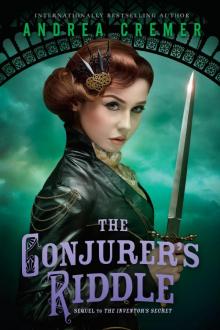 The Conjurer's Riddle
The Conjurer's Riddle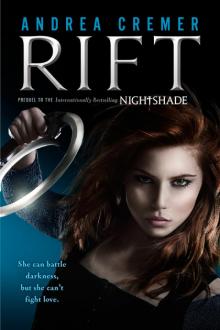 Rift
Rift Snakeroot
Snakeroot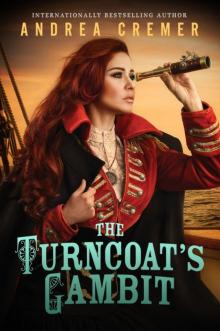 The Turncoat's Gambit
The Turncoat's Gambit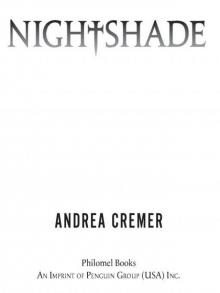 Nightshade
Nightshade Bloodrose
Bloodrose Rise
Rise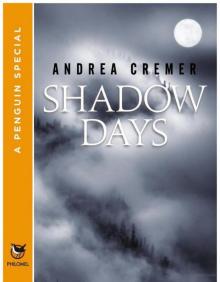 Shadow Days
Shadow Days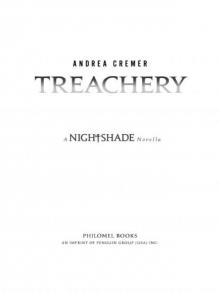 Treachery
Treachery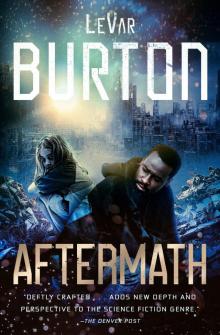 Aftermath
Aftermath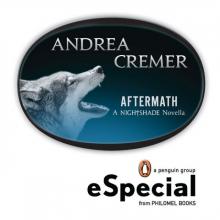 Aftermath: A NightShade Novella
Aftermath: A NightShade Novella Rise: A Nightshade Novel
Rise: A Nightshade Novel Invisibility
Invisibility